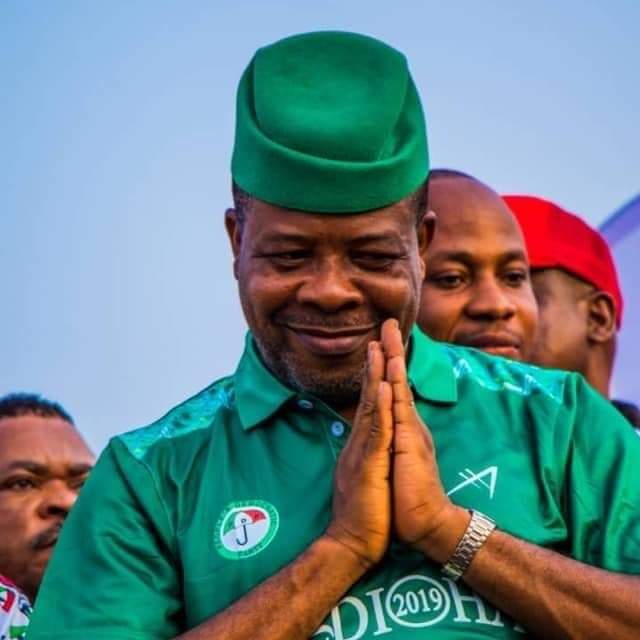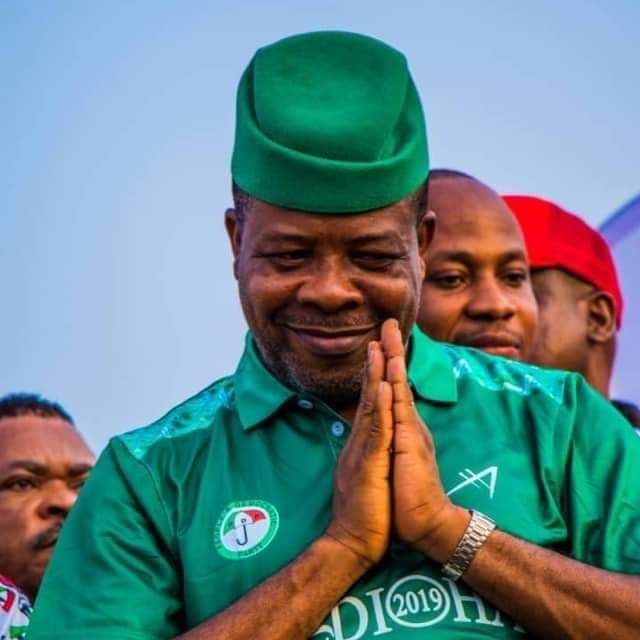Political Issues
Imo State Governor-elect, Emeka Ihedioha, What Does He Need? -By Kenneth Amaeshi

The emergence of Emeka Ihedioha as the governor-elect of Imo State, has attracted many reactions. Amongst these views is the fact that the Owerri Zone of the State has finally produced a governor after many years of Orlu rule. Beyond the emergence of the Owerri Zone is the fact that Ihedioha is from Mbaise. This is more than symbolic for anyone conversant with Imo politics. At least, it has settled the ill-perceived view that the Owerri Zone is not united and cohesive.
While I do not necessarily subscribe to zoning as an option, I strongly advocate for the best man or woman for Imo State, irrespective of where they are from and their faith. Unfortunately, these two factors have insidiously continued to undermine good governance in Imo State. Hence, I once argued that Imo State needs a better Mbakwe – a governor who sees and treats Imo State as one, as opposed to a concatenation of people and divergent interests. And perhaps, Ihedioha might be this better Mbakwe. However, for Ihedioha to play this role and rise above the ugly politics of zoning, he needs a formidable opposition. Yes, a solid opposition.

Since the emergence of Ihedioha, there have been some subtle insinuation that people should rally around him and support his cause. Some views are even more defacing – arguing that he might not live up to the high expectations awaiting his regime. In that regard, some go as far as asking for prayers to support Ihedioha, as if he was walking into a theocracy. As much as I am not anti-prayer or anti-God, these calls, in my opinion, are not often healthy and may inadvertently share borderlines with both naivety and sycophancy; the exact traits most successful politicians and leaders try to disassociate themselves from.
It is very obvious that democracy, as a system of governance, is not about agreements. It is usually far from it. It is also not about prayers. Democracy is more about disagreements, struggles, contestations, et cetera. It produces winners and losers. It is a game of numbers, which gives preference to the majority and has the tendency to marginalise the minority.
But the fact that many people prefer something does not necessarily make it “right”. The minority can also be “wrong”. As such, democracy becomes an amoral space for the triumph of the many (the majority) over the few (the minority). Stretching this perspective, Churchill, a former UK prime minister, aptly describes democracy as the tyranny of the majority over the minority.
Notwithstanding, in most
Unsurprisingly, democracy, as a system of governance, produces
In other words, democracy is not without its strengths and weaknesses. These strengths and weaknesses will obviously manifest in Nigeria. Some people will legitimately focus on the strengths, while others may choose to focus on the weaknesses in order to sustain the reproduction and strengthening of democracy in Nigeria. Most opposition parties do the latter very well and that’s exactly what Mr. Ihedioha and Imo State need.
A solid opposition will constructively keep Mr. Ihedioha on his toes to meet his election promises to Imo people. It is this constructive tension and competition that will possibly lead to some governance innovations in his regime, which will enhance the welfare and wellbeing of Imo people. But one might be tempted to ask: Where is this opposition in Imo State and where will it come from?
Of course, these are very valid questions and offer a unique opportunity for the other parties to rally together to play this role. Given the nature of politics, which can sometimes be about self-interests, as opposed to the interest of the people, the People’s Democratic Party (PDP) – the next party in power in Imo State, may not want this to happen. As such, any attempt by PDP in Imo State to consciously or unconsciously suppress and undermine the opposition will only amount to a disservice to Imo people.
Although partisan opposition helps, a strong opposition, arguably, should not necessarily be partisan. In the seeming absence of a solid partisan opposition in Imo State, Mr. Ihedioha, himself, should creatively and consciously engineer the emergence of this opposition even from outside partisan politics. This will be a test of his governance and leadership ingenuity. As it is said, power corrupts and absolute power corrupts absolutely. Mr. Ihedioha should do his best to avoid this trap no matter how alluring it is. That’s where a strong opposition can help him.
As such, the quest for some politicians to jump political ships and completely align with the Imo State governor-elect, Mr. Emeka Ihedioha, in line with the old mantra: no permanent enemies in politics but permanent interests, is nonsensical, bizarre, anti-democratic, and unrealistic. It is at best hypocritical, manipulative, and flamboyantly naïve. It could be seen as very clever and yet unpatriotic, given that it undermines the essential element of the diversity of views inherent in democracy by attempting to homogenise views, goals, and ambitions in a single party or an individual. This may work for theocracy or feudalism, but not for democracy.
Whilst Governor Ihedioha will be there for the next four years, anyone who does not like his views and style should find creative ways of coping with them and or working with the opposition to hold him to account. That’s both the danger and beauty of democracy. You can also try alternative modes of governance – e.g. grass-root movements and the civil society route – to address some of the things you consider, or perceive, to be the shortfalls of his government.
Fortunately, the quest for a better society cannot exhaustively be pursued and attained through the state as a governance apparatus. Unfortunately, the thinking that the state is everything and all things for all is one of the grand mistakes we make in Nigeria. Good enough, there is power and governance everywhere – in and outside the state. This provides a fertile ground for constructive opposition.
It is obvious that the absence of a strong opposition in the outgoing regime of Rochas Okorocha in Imo State, gave him the unfettered chance to run the State as an emperor; a mistake Imo State should never make again.
In sum, anything short of a strong opposition in Imo State could just position Mr. Iheodioha as a future Rochas in the making. But once bitten, twice shy!
Long reign Mr. Ihedioha, long reign the opposition, and long reign democracy in Imo State!
Kenneth Amaeshi is a policy analyst and professor of



















